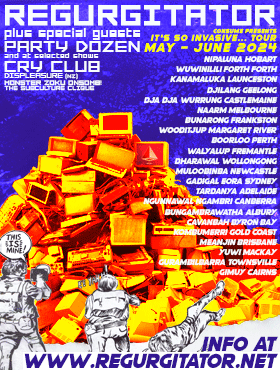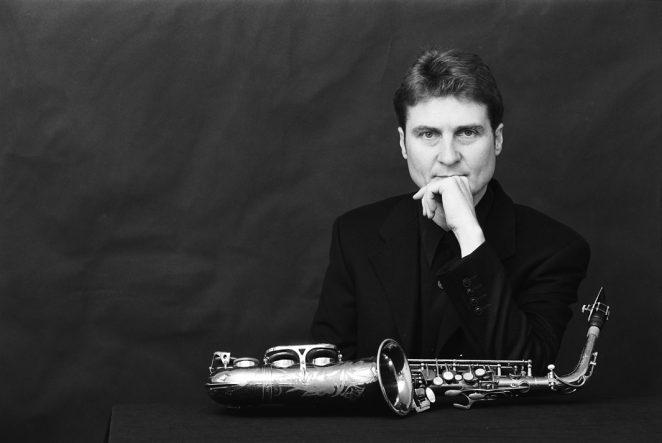
Multi-instrumentalist, composer, arranger, producer, educator and sax guy for The Rolling Stones, TIM RIES is currently in Melbourne for some dates before jetting off to join The Stones again in the UK. On Tuesday night April 24, he’ll be playing a soul review with local band The Putbacks at the Cherry Bar, followed by a performance of his Rolling Stones Project music at the Jazzlab on April 26, featuring the Monash University Big Band.
The New York based sax player has performed and recorded with a who’s who of jazz, rock, pop and world music icons including: The Rolling Stones from 1999 to the present, Stevie Wonder, Paul Simon, Donald Fagen, Michael Jackson, Blood, Sweat and Tears, Rod Stewart, Lyle Lovette, and jazz greats Red Garland, Donald Byrd, Hank Jones, Jack DeJohnette, Phil Woods, Tom Harrell, Chico Hamilton, Michael Brecker, Joe Henderson, Tony Bennett, and many more.
Ahead of his shows this week, Tim Ries was kind enough to sit down with Australian Musician editor Greg Phillips for an in depth chat about his musical journey
You grew up in Michigan, not far from Detroit. Did Motown have an effect on you?
It did. My father was a musician but like a lot of people in the southern part of Michigan, he worked in a factory … a lot of people did, either associated with the auto industry or the company he worked for was called Tecumseh Products, like the shawnee chief Tecumseh. At the time we were in Tecumseh, about an hour from Detroit. He’d work his day gig and then in the evening and on weekends he would play in bands. He was a great trumpet player but the gigs were like weddings and parties. It was just after the great depression and there was no money. His mother died and he had a bunch of siblings, so he came back and became like their mother. So he would play music and I would go to his gigs. After the gigs on the weekend, there would always be musicians at the house. There would be jam sessions at my house until 5 or 6 in the morning or we’d be at someone else’s place doing the same. He wanted me to also study classical music, so he took me to the University of Michigan where I started taking lessons. It’s a renown school for music, mainly classical. I was being taught by a classical saxophone player and he introduced me to his dance music, music of the 40s … Harry James, Duke Ellington, Woody Herman. On the school bus there was always music and the station we listened to was from Canada CLW because we were near the border of Canada. On the radio were all the top hits, mainly Motown music. From a young age, I was a Stevie Wonder freak and also Aretha Franklin, even though she didn’t record for Motown she was still a Detroit person. When I grew up, my dad would take me to the jazz clubs in the area of South Michigan. You had Detroit, Ann Arbor and Toledo, which is on the border and they were all within an hour of each other and all had healthy music scenes. My dad had a big band too, a regional band and I was introduced to that music and at the house he would play the music of Stan Getz and Charlie Parker and Louis Armstrong, who was probably my first hero as he was a trumpet player like my father. Then I started to sit in on the Detroit clubs and all of the Motown players would be there, they were just jazz musicians … I mean they were musicians … they played gospel, jazz, RnB and all of that music was infused in them. I played polkas, waltzes, Motown, classical … I never wanted to categorise myself. Even the rock music of the 60s and 70s was open and free and it’s kind of getting back to that again where music is not just infused by one thing. As we know the Stones were hugely influenced by the blues and Charlie is into jazz …
Are there one or two albums which were important to you?
I was into the big bands at the time so Maynard Ferguson was a big one and then later on I got to play with him, it was my first real gig on the road. My sister’s boyfriend, who she ended up marrying introduced me to Coltrane’s Ascention, I was about 14 and it was maybe a little too much for me at that age. Then I got introduced to Miles Davis and I listened to My Funny Valentine. I listened to it over and over. I would put my headphones on and get totally enraptured by side A and listen to every nuance and how the piano accompanies him and I got really in depth with that album. That was probably the first modern jazz record I really got into. Then I started listening to more Miles, and listened to everything really.
I was going to ask if you’d met any of your heroes but you actually played or recorded with Stevie Wonder didn’t you?
I did some gigs but didn’t do a formal studio recording. The gigs that we did I think were recorded. Apparently with Stevie, when he goes into the studio, he’s got 60 or 70s songs and he only records maybe 10, so I know there are probably hundreds of songs he has recorded but never released. I’d love to hear those songs. We did these concerts at Radio City Music Hall in New York and around that same time I did Michael Jackson’s comeback which was right around 9/11. In 2001 we did a series of rehearsals and gigs at Madison Square Gardens and it was the 9th and 10th of September and of course the next day 9/11 happened. That was interesting, it was a live filming for HBO. Also around that time I had done a recording with Elvin Jones, so I got to record and play with my favourites … Stevie, Michael Jackson, one of the greatest entertainers ever and then Elvin all within the same few weeks, it was heaven.
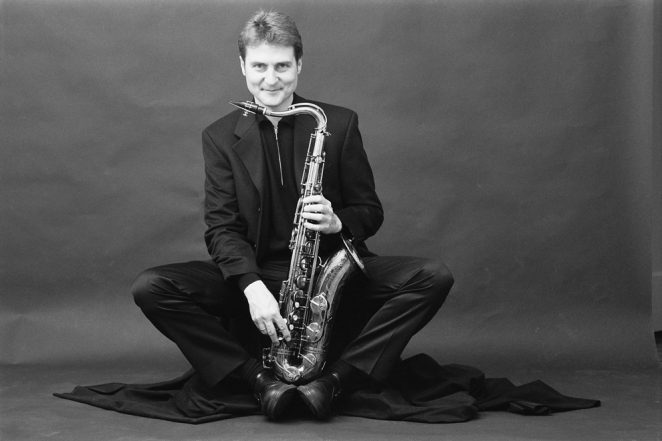
You’ve been a music educator for a long time. What do you get out of teaching music?
I get way more out of it than I’m sure they do or maybe it’s equal. As a kid, all of my instructors I had this ultimate reverence for. You’d walk into the room and be scared to death to go in. You had to be prepared. They were old school teachers … here’s the assignment, you do this, practice that and if don’t come in prepared then get out. In a way that was a really good thing, yet terrifying. I wanted to strike a balance with my students, feeling like I wasn’t above them. We’re all on the same path of trying to get better at music and even at 58 years old, I am still a student and still trying to get better at music. So the lessons I do with young people are energising. To have an 18 year old student come in and start asking questions and playing … you get that certain buzz going with the student … you give them a little bit of information. They come back and they’re on fire and then they light a fire under you because they’ll say you told me to do this but then I went and also did this! It drives you both to a higher place. I mean not every student comes in with that attitude but most of the time, at a certain age they are there to develop and learn. I learn a great deal from young people because they are the future.
You travel all over the world playing music and experience many music scenes. A lot of music now is being made on laptops in bedrooms. Not all kids are into real instrumentation. Are you seeing a decline in interest in playing ‘real’ music?
I would say no. There is very much a thing when you play a live instrument, an instrument that vibrates from the soul … whether it’s a human voice or a saxophone, trumpet, guitar … they are still being played by a person that resonates emotion into that instrument. Even though an electric guitar is an electric instrument, it still has a human hand touching it. But a musical person with a laptop can create very musical things too. The one thing I would say about electronic music being created in someone’s apartment, it’s a good thing and a bad thing that everyone can become a composer. Everyone has the ability to sit down and say look, I created a song. Here’s a beat, here’s a hook … boom, and some people get hits from that. Is it great though? I don’t know. In general there are few geniuses in the course of history of mankind. Still the greatest music and literature written was done before there was electricity. You have Mozart, Beethoven, Bach … it doesn’t get better than that. We’re just trying to do our best. When I hear a symphony by one of the great composers I think and hope that maybe at some point I can write something as good one day but probably not. I’m trying to get to the point of being able to write something that magnificent. Sometimes I think that having internet access to everything is good but again is bad. Young people’s attention spans are not what they were, if you can’t get their attention in a nano-second, they move onto something else. I have 15 year old twins and one of my twins can sing 2,000 songs, anything that comes on to the radio she can sing. She has great ears, good pitch, great memory but she doesn’t know groups. I’ll ask her, who was that? She’ll say I don’t know but she knows the song. When I was young you would listen to a group, there was the thing … you were a Beatles fan or a Stones fan or Yes or whatever rock group you were into. With electronics and the internet, everything is available to you but I don’t see it necessarily as creating geniuses. As I get older I realise there is limited time to listen to the brilliant music which has already been recorded.
Since you were last in Australia you have been to South America and Europe with Stones. Have you had time to play or record yourself? You were doing something in Spain I believe?
I met this dancer, Sara Baras many years ago and over the years I have done a lot of guest appearances with her and at some point she decided that we should do a show together. We started working on this show and we did a lot of stuff but then it worked out that I couldn’t do all of the concerts. It was really great to perform with her because she is one of the great dancers. Her ensemble always has 6 or 8 dancers, two guitars, two percussion, two vocalists and then myself. That was great and when I was there I learned a lot from these musicians and singers. Recently I started playing with this pianist, Dorantes a beautiful pianist from Seville. Talking about electronics and the internet before, it’s funny. I fought against being on Facebook. I just joined recently, only because I was in New York during the Flamenco Festival which comes to New York for 3 weeks every year. I played with this pianist Dorantes for the festival. I started going to as many shows as I could. If I was free I’d go to a concert, wherever it was. I got to sit in with a different set of singers and dancers. One dancer who was coming to the festival was Jesús Carmona, an amazing dancer. I wanted to go just as a spectator. I had a great seat and I was blown away by his performance and everyone on stage with him. Then afterwards, I went backstage to hang out and there’s this guitarist there who I hadn’t seen for ten years and he said I tried to send you a Facebook message, we wanted you to perform with us. I said, oh man that’s a fan page and I don’t check any messages, so after that I started doing the Facebook thing. This summer I am going to be in Andalusia, Cadiz and Seville and Barcelona. The Rolling Stones are touring and I am staying over there for about a month and a half and recording in a studio with a bunch of guitarists and singers and dancers. I have been writing a lot so I want to see what will work with these singers and dancers. I am bringing my version, what I am feeling with the music and trying to learn from it and I know these great musicians and singers will take it to another level.
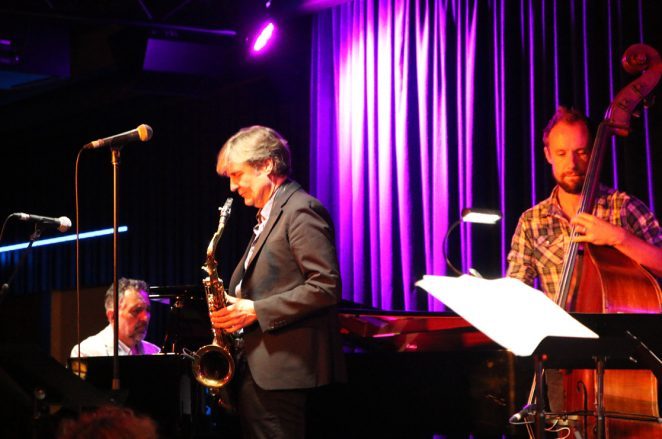
Research was just released which presented facts to support that Melbourne is the world music capital in terms of the amount of venues, bands, and gigs available per person. Do you notice the vitality of the music scene in Melbourne when you come here?
There is some great talent here. I play with some wonderful musicians in great venues. There’s the old Bennetts Lane, now Jazzlab where I will be playing a couple of gigs this time and there’s the Cherry Bar where I will be playing … different kind of rooms but very active. There’s Bird’s Basement where I played last time I was here, a beautiful venue. I don’t know so many more but I know there’s a great vitality of wonderful players here. It seems very healthy. It’s a cool thing that there are healthy scenes all over the world. Budapest has a very healthy scene and great venues, not so many venues. You find these areas. Helsinki, Finland has great musicians. Spain is a good example too with some really nice venues and people that support the music but yeah, Melbourne is wonderful. I always have a great time here.
In general how many saxes do you travel with?
It’s difficult travelling with more than two. It’s tenor and soprano. I would love to play alto but I can’t travel with three. I’ve been playing more trumpet too, so I have been practicing that. When I was in Spain working with this dancer, they found out that I play trumpet and they heard me play something. While I was there I borrowed a trumpet and borrowed a mouthpiece and went into the studio and thought, ok maybe I can do this so I’ve started to practice that more. On the Stones tour there’s the ability to play soprano, tenor, alto and bari on the gig and I also take a flute and clarinet. If I am home, I mostly sit at the piano and compose and write. I do a lot of writing melody wise on the trumpet. I don’t like to write as a saxophonist because I don’t want it to sound like saxophone music.
You must have tried a lot of different saxophones, why do you play Selmer?
I have a bunch of different ones. There’s a company in New Jersey that I have been working with, this guy Les Silver who has a company RS Berkley and he partnered with this guy to make an instrument called the Virtuoso. In a way I helped him to design this instrument, so I am playing that as well. With the Rolling Stones, I am playing the alto Virtuoso and I play my Selmer VI tenor. When I was a kid I had an old Martin saxophone, which is also a great instrument. When I was in 10th grade I got a new Selmer. My dad came into the school. We were in the middle of class and I saw the truck pull up which was delivering it. I’ve collected horns over the years and have different vintages. I have a 1952 Super Balanced, which is what Coltrane played on a lot. There are all these serial numbers which relate to a certain year, the Mark VI that I have is like 80000. A lot of players have their particular preference as to what vintage they like.
What elements make a sax great? With guitars it might be the body or neck or with drums, the shells…
Well supposedly … I don’t know if it is true but the brass from the Selmers when they started, was the brass from the old shell casings from the war. I guess whatever the percentage of copper or I don’t know what the percentage of composition is but the way the brass was made back then, and also the thickness of it and the fact that it was hand crafted … Then there is the Conn company and a lot of people love those instruments. There’s the KIng company … King Super 20s, a lot of musicians play those. It doesn’t have to be a Selmer but it is very personal. I tell my students to experiment. It takes a long time to find your own particular thing… what instrument or mouthpiece fits you… the reeds, ligature, all these things make a difference. Eventually you find that most people sound like themselves. You fine tune your thing.
What have you learned about getting a good recorded sax sound?
There are very few truly great engineers that will allow you to get your sound. I did a recording in Chicago many years ago and the guy came into the room and he said just play for me for a while. So he sat there and listened and he walked around to the front, then slightly left, slightly right. Then he was thinking about what mic might be good. He came out with a couple of different mics and set them up in different places. Then after all of that then he went and started recording me. Then he’d come out and adjust the mic again and after about twenty minutes, he’d recorded something and he said come in and have a listen. I was like, wow you got MY sound. Most sound people and recording engineers get the sound of a saxophone that THEY hear. They’ll push this, push that, EQ this, reverb etc and go there’s your sound. Well … that’s YOUR sound that’s not MY sound. It also takes the right room. The sound of the room is important. I don’t like close-miking, so if you have a microphone that is one foot from the bell, you are only getting that real immediate sound. Whereas if it is 3 feet away, you are getting more of the depth of it because with saxophone, it isn’t just about the bell. A percentage of the sound comes out of there. If the right hand isn’t down and it’s only the left hand, the upper portions of the horn have to be recorded up there too and that’s why a microphone further away captures the whole instrument. The room is important to get the right vibration, the sound and then there’s a good microphone, good engineer. All of that is important. Then there is the difference between analogue and digital. Is digital as good? You get the argument that digital is very clean but then it is really just zeroes and ones, is that really music? You are compressing sound into something it wasn’t meant to be. There was a study done in England about the damaging effects of playing compressed music. The scientist was saying that your brain is constantly negotiating zeroes and ones. While you are listening to the music, you don’t know it is happening, all you are hearing is music. It’s clean and it is nice but it is very flat and your brain is working way harder to than it needs to. So we are talking recording and what is important is the sound of YOU, you are the instrument. The instrument is just playing what you are putting through it. Charlie Parker played on all kinds of different instruments but it still sounded like Charlie Parker on every one. Charlie Parker is a good example. He hocked all his horns because he was a junkie, so he played on different horns all the time and still sounded like himself every time. The most important thing is what you sound like outside of the instrument.
Who would you consider to be your musical soul mates, the musicians who you just gell with on stage?
There are so many and that’s the beauty. You can gell with these different people from different cultures, backgrounds, religions, and often times they don’t speak the same language. Like those flamenco artists, most of them don’t speak any English and my Spanish is horrific, so it is only the music. It’s just a connection with that person. There was actually another study done in Sweden by a scientist and it showed that when people are in a room together and they sing, their heart rates beat as one. That’s why in congregations, churches, synagogues, mosques … that’s why prayer or singing has been carried through for thousands of years. That idea that when you are singing together, they discovered that the heart rates link up pretty quickly. So that connection can happen very quickly with musicians. If you are on stage or in rehearsal with somebody and you have a connection with somebody you have never met, you can be linked to that person’s soul because you are vibrating together as one. That has happened a lot over the years. That is the reason I do what I do. That is the reason I travel and play with so many wonderful people. You are connecting with those people on a very high level.
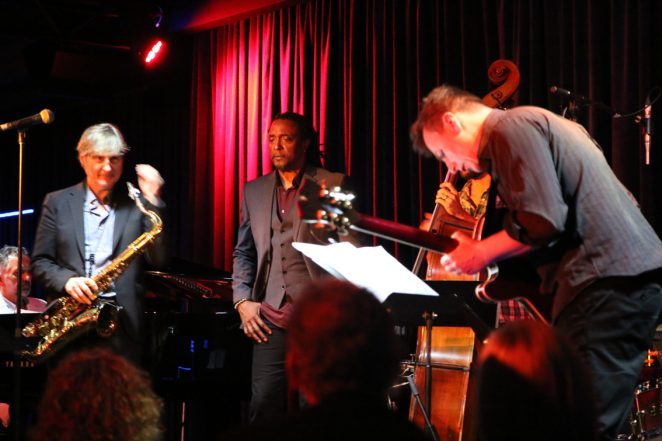
The Rolling Stones Project gigs that you are performing here are with the Monash University Big Band. Have you had the opportunity to play with them yet?
Last time I was here, I went to Monash with Bernard Fowler and we did a workshop. We spent the afternoon and we talked a bit and then eventually we had a lot of the students come up and play with us … two or three different drummers and bassists and it was very cool. When I was coming this time I thought maybe they’d be interested in doing the big band arrangements of these Rolling Stones songs. They were totally game to do it. I haven’t worked with all of them but they have had the music for a while, so they’ve been practising it. It’s nice because with the music, there’s lots of room for people to improvise on. Then when I play at the Cherry Bar, I am doing more of a soul thing and I asked a friend Aaron Choulai, a pianist from here who I should use and he said I should contact The Putbacks. James Young at the Cherry Bar liked them a lot too, so they’re doing it with me. The singer is Talei Wolfgramm … she’s joining us and it’s going to be a lot of fun.
After this you get back with The Stones again. What’s that first rehearsal day like when you all get together?
It’s always fun. I’ve been with them for 20 years now and I’m one of the newer people. Bernard has been there for 30 years. Chuck has been there for almost 40 years. It’s a family. You’re travelling with these people … same hotel and you’re on the plane with them. On the off nights you go and see concerts or have dinner with them, so it is like seeing you’re cousins, your family. The first day is just catching up but then it is business and they want to get through a lot of material in a short period of time. After all of the hellos, we rehearse for a 5 or 6 hour period everyday. With the huge catalogue, it gets whittled down and they say ok, we’ll centre more on these now. Of course they do the hits because people want to hear Satisfaction, Gimme Shelter and Honky Tonk Women but then they try to put in at least one or two of their new things and something from the catalogue which isn’t played so often. So they alternate six or seven tunes per night that are slightly different, which I love.
I remember doing a backstage interview with Chuck Leavell once at a Melbourne Stones’ gig and basically the crew did the soundcheck. Is that the norm? How often does the whole band Soundcheck?
Yeah well the crew are setting up the gear and they all play. But we do a rehearsal for every city for an hour-ish, depending on the room and what they want to cover. Once we have done the initial rehearsal period at the beginning, then we’re not going to rehearse much but we do a soundcheck for every city. They only play like twice a week, so on tour that’s why I try to set up gigs because I like playing.
I see you have one of your own gigs in the UK, where you’ll be playing with Chuck Leavell, Bernard Fowler and Daryl Jones! How often do you get to play your shows with all of the Stones’ side guys?
As you know Bernard and I do it a lot. Then Daryl does it the next amount. Chuck has done it a couple of times. Charlie Watts often comes out and just hangs but sometimes he’ll play on a tune or two. I get to meet all my friends around the world and sit in and jam. That’s how I met these guys in Melbourne. I went into Bennetts Lane before a Stones gig and I ran into Aaron Choulai. So I met him and we started gigging and did a tour, came back and did the Melbourne Jazz Festival. But yes, on the off nights it is fun to play!
Tim’s remaining Australian dates include:
Anzac Day Eve. Tuesday 24 April. Doors 8pm.
Cherry Bar, Melbourne
Soul Serenade featuring Tim Ries with The Putbacks & Talei Wolfgramm (as his amazing backing band).
A Motown Celebration with Tim Ries playing songs from the bands he has played with Stevie Wonder, The Temptations, The Four Tops and some surprises.
Support from Bernadette Novembre.
Tickets: Pre-sale just $20 + b/fee, $25 on the door, if available.
https://www.eventbrite.com.au/e/tim-ries-of-the-rolling-stones-usa-tickets-45007764435
April 26 Jazzlab, Melbourne
Tim Ries’ Rolling Stones Project
For this unique performance, Tim will be joined by the Monash University Big Band under the direction of Jordan Murray to perform music from his Rolling Stones Project.
https://jazzlab.club/608-tim-ries-usa-with-monash-university-big-band


